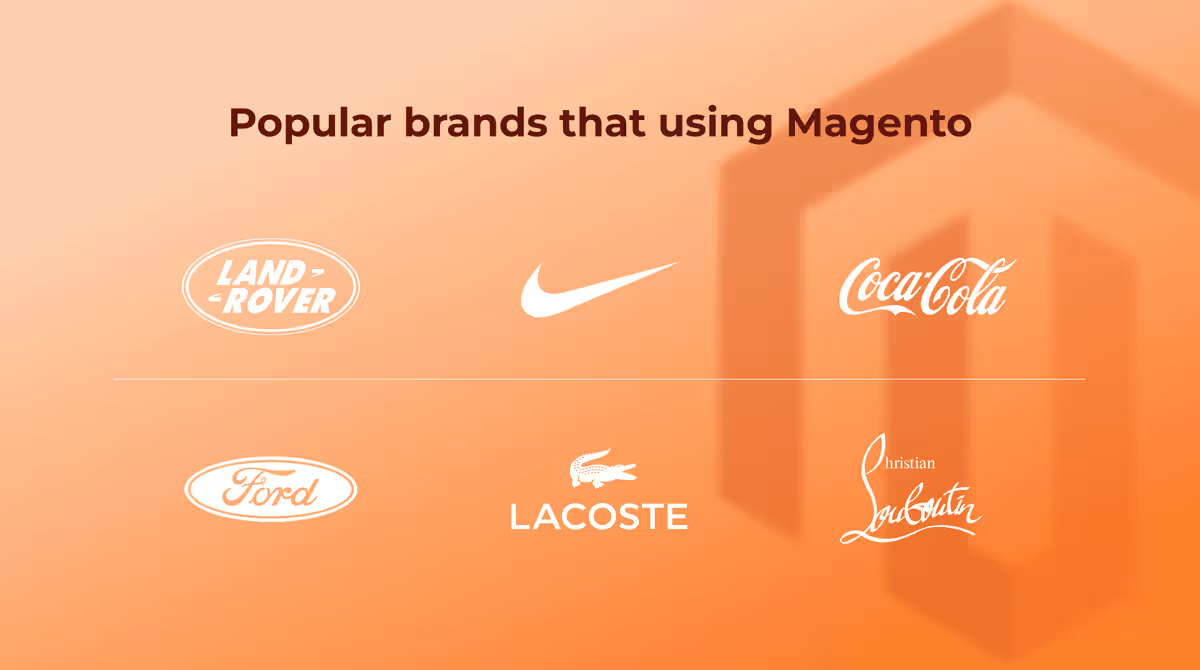What Is Magento and What Is It Used For?
Magento is a leading e-commerce platform acquired by Adobe, designed to help businesses create and manage their online stores. It offers flexibility and a range of features that cater to various needs.
To get a website using Magento, you typically start by choosing a hosting provider that supports Magento installations. Next, you can either install Magento yourself, which may require some technical knowledge, or hire a developer to set it up for you. Once installed, you can customize your store using Magento’s extensive themes and extensions, allowing you to tailor the design and functionality to meet your specific business needs.
Magento as a Powerful E-Commerce Platform
Think of Magento like a set of Lego bricks—you can build a store that fits your vision. Although Magento can be used for various types of websites, it is primarily designed for e-commerce due to its high customizability and scalability.
This allows businesses to tailor their online stores to meet unique needs, whether they want to sell just a few products or thousands. With its robust features, Magento effectively manages inventory, processes payments, and enhances customer engagement.
Magento's Main Purpose and Benefits for E-Commerce
Magento's main purpose is to simplify online selling while providing a powerful set of tools for business growth. Adobe's vision emphasizes that "People Buy Experiences, Not Products," highlighting the importance of integrating commerce with content and data to create meaningful customer experiences.
This aligns with Magento's capabilities, which include built-in SEO features, mobile responsiveness, and a wide range of payment options, allowing businesses to reach more customers and enhance their online presence effectively.
Key Features of Magento for E-Commerce
When considering Magento as an e-commerce platform, it's important to distinguish between essential features and those that are add-ons or enhancements.
Magento Must-Have Features
Customization Options : Magento lets you really tweak and personalize your online store. This is super important if you want your shop to stand out and reflect your brand.
Security Features : Keeping your customers' information safe is a big deal. Magento has strong security measures built in, which is essential for any e-commerce site.
SEO and Marketing Tools : If you want to be on the first page of Google, good SEO tools are a must. Magento helps you optimize your site so it ranks better in search engines.
Mobile-Friendly Design : Since many shoppers use their phones, having a website that works well on mobile devices is crucial. Magento ensures your store works well on all screens.
Scalability : As your business grows, you want a platform that can grow with you. Magento is built to handle more traffic and products without slowing down.
Magento Add-On Features for Extra Functionality
Multi-Channel Integration : You can add features to sell on sites like Amazon or eBay, which is great for reaching more customers. This isn’t built into Magento by default but can be added easily.
Analytics Tools : While not essential, they’re really useful for understanding customer behavior and sales trends.
Personalization Features : These are nice to have for creating tailored shopping experiences for your customers. They can help make your store feel more personal.
Third-Party Integrations : You can connect with different payment options and shipping services, which can enhance how your store operates.
Customer Support Tools : Basic support features are included, but you can add more advanced tools like live chat to improve customer interaction.
Extensive Customization Options
Magento's extensive customization options allow businesses to tailor their online stores to fit specific needs, which is a significant differentiator from many other e-commerce platforms. While platforms like Shopify offer templates and themes, Magento provides a more flexible approach with thousands of themes and plugins available.
This allows for detailed adjustments in design and functionality, enabling brands to create unique user experiences that reflect their identity. Such depth of customization often appeals to larger businesses with specific requirements.
Multi-Channel Integration and Plugin Support
Magento stands out with its robust multi-channel integration capabilities. Unlike many other platforms that may limit sales to a single channel, Magento allows businesses to easily connect with marketplaces like Amazon, eBay, and social media platforms. This flexibility is enhanced by extensive plugin support, enabling users to add functionalities specific to their needs, which is often more comprehensive than what competitors like WooCommerce or BigCommerce offer.
Strong SEO and Marketing Tools
When it comes to SEO and marketing, Magento offers powerful built-in tools that help businesses improve their visibility online. Compared to platforms like Squarespace, which may have basic SEO capabilities, Magento provides advanced features such as customizable URLs, meta tags, and rich snippets. These tools enable businesses to implement effective marketing strategies, such as personalized promotions and customer segmentation, making it easier to reach and convert target audiences.
Robust Security Features
Magento prioritizes security with features such as advanced encryption, secure payment processing, and compliance with industry standards. This level of security is often more comprehensive than what is provided by platforms like Wix or Shopify, making Magento a preferable choice for businesses that handle sensitive customer data. Magento’s ability to integrate with various security tools further enhances its protective measures against threats.
Mobile-Friendly Design
Magento's mobile-friendly design ensures that online stores function seamlessly on all devices. While some platforms may offer mobile-responsive themes, Magento’s built-in capabilities allow for full customization to ensure an optimal mobile experience. This focus on mobile usability helps businesses cater to a broader audience, as more consumers shop using their smartphones.
Scalable Architecture
One of Magento’s key advantages is its scalable architecture, which supports business growth without compromising performance. As businesses expand, they can easily scale their Magento stores to accommodate increased traffic and product listings. This scalability sets Magento apart from smaller platforms that may struggle under higher demands, making it ideal for growing enterprises.
Downsides of Magento as a Web Platform
While Magento offers many advantages, there are some downsides to consider before choosing it as your e-commerce platform. It’s essential to weigh these factors to determine if Magento is the right fit for your business needs.
Complexity and Learning Curve
Magento can be quite complex, especially for those without a technical background. Its extensive features and customization options mean that it often requires a learning curve to navigate effectively. This can be challenging for small business owners who may not have the time or resources to invest in learning the platform.
To deal with this complexity, consider investing in training for yourself or your team. There are numerous resources available, including online courses and tutorials, that can help you understand the basics. Moreover, hiring a professional developer or agency with Magento expertise can ease the transition and help you set up your store more efficiently. This way, you can focus on growing your business while they handle the technical aspects.
Higher Costs for Hosting and Development
Magento can also come with higher costs, particularly for hosting and development. Since it is a robust platform, it typically requires more powerful hosting solutions to ensure optimal performance.
To manage these costs, start with Magento Open Source, which is free to download, and gradually add features as your business grows. You can explore managed hosting providers specializing in Magento or a SaaS solution with subscription plans that allow you to choose a plan that fits your budget.
Also, consider setting aside a budget for development and maintenance to ensure you have the resources needed to keep your store running smoothly without overspending.
By being aware of these potential downsides, you can make a more informed decision about whether Magento is the right choice for your e-commerce business.
Who Uses Magento and Why? (Examples You Know)
Many businesses across different sectors choose Magento for their e-commerce needs due to its flexibility and scalability. Let’s explore the diverse landscape of Magento users and the reasons behind their choice.
Industries That Use Magento and Why
Retail
Retailers appreciate Magento's customization options to create unique shopping experiences and manage vast inventories.
Fashion
Fashion brands benefit from Magento's rich media capabilities, allowing for stunning product displays that enhance customer engagement.
Electronics
Electronics businesses value Magento’s strong inventory management and product categorization features to handle numerous items.
Beauty and Cosmetics
This industry uses Magento for its marketing tools that help promote products effectively to target demographics.
Food and Beverage
Magento's ability to manage multiple product variants makes it ideal for businesses with diverse offerings.
Automotive
Automotive retailers rely on Magento to provide detailed product information and enhance the customer buying journey.
Home and Garden
This industry utilizes Magento for its customization options to create appealing online stores.
Travel and Hospitality
Travel agencies and hotels use Magento for its ability to manage bookings and promote packages seamlessly.
Health and Wellness
Businesses in this sector appreciate Magento’s compliance with regulatory requirements for selling health-related products online.
Why Developers and Marketers Prefer Magento
Developers appreciate Magento for its flexibility and extensive customization options. The platform offers a robust framework that allows for creating complex features and integrations tailored to specific business needs.
Moreover, Magento has a large community and extensive documentation, which makes finding solutions and resources easier, enabling developers to build and maintain high-quality e-commerce sites efficiently.
On the other hand, marketers favor Magento because of its powerful SEO capabilities and integrated marketing tools. The platform allows for advanced product categorization, customizable landing pages, and built-in promotional tools that help attract and retain customers.
With features like customer segmentation and targeted marketing campaigns, Magento enables marketers to create personalized shopping experiences that drive sales and customer loyalty effectively.
Examples You Know: Popular Brands Using Magento


